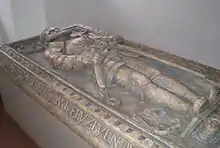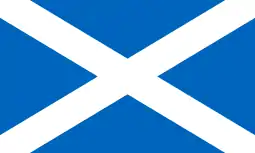Pardubice
Pardubice (Czech pronunciation: [ˈpardubɪtsɛ] (![]() listen); German: Pardubitz) is a city in the Czech Republic. It has about 92,000 inhabitants. It is the capital city of the Pardubice Region and lies on the river Elbe, 96 kilometres (60 mi) east of Prague. The historic centre of Pardubice is well preserved and historically significant and is protected by law as urban monument reservation.
listen); German: Pardubitz) is a city in the Czech Republic. It has about 92,000 inhabitants. It is the capital city of the Pardubice Region and lies on the river Elbe, 96 kilometres (60 mi) east of Prague. The historic centre of Pardubice is well preserved and historically significant and is protected by law as urban monument reservation.
Pardubice | |
|---|---|
 The main square as seen from the Green Tower | |
 Flag  Coat of arms | |
 Pardubice Location in the Czech Republic | |
| Coordinates: 50°2′19″N 15°46′45″E | |
| Country | |
| Region | Pardubice |
| District | Pardubice |
| First mentioned | 1295 |
| Government | |
| • Mayor | Martin Charvát (ANO) |
| Area | |
| • Total | 77.71 km2 (30.00 sq mi) |
| Elevation | 237 m (778 ft) |
| Population (2020-01-01[1]) | |
| • Total | 91,727 |
| • Density | 1,200/km2 (3,100/sq mi) |
| Time zone | UTC+1 (CET) |
| • Summer (DST) | UTC+2 (CEST) |
| Postal code | 530 01 |
| Website | www |
Factories include the Synthesia chemical factory, an oil refinery Paramo, a heavy machinery factory and an electronic equipment plant. The city is well known for its sport events, which include the Great Pardubice Steeplechase in horse racing, the Golden Helmet of Pardubice in motorcycle racing, and the Czech Open in golf and chess.[2]
History
The oldest extant document regarding Pardubice comes from 1295.
The area had a monastery founded in 2nd half of 13th century and the city was founded c. 1340.[3] In 1491, Pardubice was bought by William II of Pernstein, who continued to expand the town and made significant impact on its prosperity. Until 1918, the town was part of the Austrian monarchy (Austria side after the Austro-Hungarian Compromise of 1867), head of the PARDUBITZ district, one of the 94 Bezirkshauptmannschaften in Bohemia.
In 1845, the first train arrived to Pardubice.[4] The town was connected to other railway lines so Pardubice could thrive even more. New industrial enterprises started to emerge in the town, namely a distillery, a factory for mill machines of Josef Prokop and sons and Fanta's Factory. Since 1874, the Great Pardubice Steeplechase (Velká Pardubická) horse race has taken place every autumn (second Sunday in October). On 13 May 1911, Ing. Jan Kašpar made history by flying the first long-haul flight towards Prague. In Pardubice, industrial expansion was on the rise, especially after the First World War. However, during the Second World War the town was damaged by air strikes of the Allies.[5] The Fanto Werke refinery at Pardubice was repeatedly bombed during the Oil Campaign of World War II, and forced labor was provided by a concentration camp.[6][7] Tesla electronics manufacturer operated from 1921–1989, and the Foxconn factory was established in June 2000. After 1989 the town continued to develop and flourish; the Chateau and its surroundings of estates were reconstructed. Pardubice has established contacts with foreign municipalities.
Geography
Pardubice is situated on the bank of the second longest river in the Czech Republic, the Labe River, where there is a mouth of another river called Chrudimka. Pardubice is located at approximately 15° east longitude and 50° north longitude. The city is located 100 km east of the capital city of Prague, 150 km north-west of Brno. Pardubice is in the area of Labe Lowlands with average elevation of 225 m and its area is 78 km2. The area is of lowland character without many hills. One exception is a nearby hill, Kunětická hora.
Transport
Pardubice is an important railway junction. From Pardubice come tracks to Prague, Ostrava, Hradec Králové and Jaroměř or Havlíčkův Brod. Railway station Pardubice main station is very busy, all trains of Czech railways, RegioJet and LEO Express stop there.
Pardubice is served by Pardubice Airport.
Industry
Pardubice is called the city of industry. The dominant industries are chemical industry, electrical engineering and mechanical engineering. The chemical industry is mainly represented by a company Paramo and Synthesia, which was founded in Pardubice-Semtín as a stock factory for explosive substances. This field of industry together with the factory went through significant development, especially in 1960s. Synthesia is now one of the leading Czech companies manufacturing cellulose, pigments and dyes, and organic compounds. Synthesia is also a major exporter mainly for the EU countries and is associated with the invention of Semtex plastic explosive. Paramo – formally known as Fanta's Factory was until 2012 one of the major companies of its kind, but during the year a major shareholder decided to significantly suppress its production and the future of Paramo is still uncertain.
Sights
Pardubice is dominated by the Green Gate with remains of the town's fortifications. The Chateau, which has been reconstructed, is located nearby. The city itself has many historical buildings, for example, Kamenná vila (Stone Villa), Crematorium, Dům U Bílého koníčka (House at the White Horse), Wernerův dům (Werner's House), Dům U Jonáše (At Jonah's), the City Hall. Churches are dedicated to the Our Lady of Sorrows, St. John the Baptist, St. Bartholomew.
 St Bartholomew's Church on Republic Square in Pardubice
St Bartholomew's Church on Republic Square in Pardubice Vojtěch I of Pernstein's tomb in St. Bartholomew's Church in Pardubice
Vojtěch I of Pernstein's tomb in St. Bartholomew's Church in Pardubice The Green Tower, Pardubice and the historical city centre
The Green Tower, Pardubice and the historical city centre Einmannbunker
Einmannbunker Pardubice castle
Pardubice castle
Sport
The ice hockey club Dynamo Pardubice plays in the Czech Extraliga. The team plays its home games at Tipsport Arena. The city was first represented in the top national football competition by SK Pardubice in the 1930s and 1940s. Later VCHZ Pardubice played in the top national league in the 1968–69 season. As of 2020/2021, the highest-ranked team from the city is FK Pardubice, which plays in the first-tier Czech First League. Women's team SK DFO Pardubice plays in the Czech First Division (women). The basketball team is BK JIP Pardubice.
The city is also home to the Golden Helmet of Pardubice (also known as the Czech Golden Helmet), a motorcycle speedway competition held at the Svítkov Stadium. The Golden Helmet has been run since 1929 is one of the most prestigious individual titles in world speedway outside of the Speedway World Championship or a riders national championship. Winners of the Golden Helmet have included World Champions Ole Olsen, Erik Gundersen, Hans Nielsen and Nicki Pedersen (Denmark), Ove Fundin, Per Jonsson and Tony Rickardsson (Sweden), and Jason Crump and 2014 winner Chris Holder (Australia). Ole Olsen holds the record for the most Golden Helmet wins with 7 (1970, 1971, 1972, 1975, 1977, 1979 and 1980).
In 2018 Pardubice is for the first time represented in the Czech rink bandy league.[8]
Notable people
- Gustav Gärtner (1855–1937), pathologist
- Věra Vovsová (1912–1998), painter
- Jan Tauc (1922–2010), physicist, introduced the concepts of Tauc gap and Tauc plot to the optical characterization of solids
- Jaroslav Stark (1960–2010), mathematician, worked mostly in the fields of chaos theory and systems biology[9]
- Dominik Hašek (born 1965), ice hockey player
- Edita Adlerová (born 1971), classical mezzo-soprano
- Radek Baborák (born 1976), French horn player and conductor
- Jiří Welsch (born 1980), basketball player
- Michal Meduna (born 1981), footballer
- Aleš Hemský (born 1983), ice hockey player
- Filip Bandžak (born 1983), opera singer, baritone
- Iva Kramperová (born 1984), classical violinist
- Tomáš Nosek (born 1992), ice hockey player
- Filip Zadina (born 1999), ice hockey player
Twin towns – sister cities
Pardubice is twinned with:[10]
 Bełchatów, Poland
Bełchatów, Poland Çanakkale, Turkey
Çanakkale, Turkey Doetinchem, Netherlands
Doetinchem, Netherlands Merano, Italy
Merano, Italy Pernik, Bulgaria
Pernik, Bulgaria Rosignano Marittimo, Italy
Rosignano Marittimo, Italy Schönebeck, Germany
Schönebeck, Germany Selb, Germany
Selb, Germany Skellefteå, Sweden
Skellefteå, Sweden Vysoké Tatry, Slovakia
Vysoké Tatry, Slovakia
Cooperation agreements
Pardubice cooperates with:[11]
 East Lothian, Scotland, United Kingdom
East Lothian, Scotland, United Kingdom Golegã, Portugal
Golegã, Portugal Jerez de la Frontera, Spain
Jerez de la Frontera, Spain Sežana, Slovenia
Sežana, Slovenia.svg.png.webp) Waregem, Belgium
Waregem, Belgium
References
- "Population of Municipalities – 1 January 2020". Czech Statistical Office. 30 April 2020.
- http://www.czechopen.net/en/history-of-festival/
- Lisa Dunford; Brett Atkinson; Neil Wilson (2007). Czech & Slovak Republics. Lonely Planet. p. 249. ISBN 978-1-74104-300-6.
- HONS, Josef (2007). Čtení o dráze olomoucko-pražské. Praha: Mladá fronta. ISBN 978-80-204-1597-4.
- "Pardubice si nálety z roku 1944 stále pamatují". Český rozhlas.
- "archive". Cestiromove.ecn.cz. Retrieved 14 April 2011.
- "6. DV-BEG – Einzelnorm". Gesetze-im-internet.de. Archived from the original on 3 November 2012. Retrieved 14 April 2011.
- "První utkání Extraligy 2018" (in Czech). Česká asociace bandy z. s. 11 May 2018. Retrieved 7 June 2020.
- Paul Glendinning (16 June 2010). "Jaroslav Stark obituary | Science". The Guardian. UK. Retrieved 14 April 2011.
- "Partnerská a spřátelená města" (in Czech). Statutární město Pardubice. Retrieved 7 June 2020.
- "Spřátelená města" (in Czech). Statutární město Pardubice. Retrieved 7 June 2020.
Further reading
- Movsesian, Sergei; Klíma, Lukáš (2009). Czech Open: Pardubice Phenomenon. Caissa Hungary. ISBN 978-80-86725-08-6.
External links
| Wikimedia Commons has media related to Pardubice. |